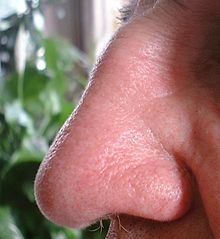코
Jump to navigation
Jump to search
| ||||||||||
| 코콕콖콗콘콙콚 콛콜콝콞콟콠콡 콢콣콤콥콦콧콨 콩콪콫콬콭콮콯 | |
| 켸 ← | → 콰 |
|---|---|
Korean
[edit]| Picture dictionary | |
|---|---|
|
Etymology
[edit]First attested in the Seokbo sangjeol (釋譜詳節 / 석보상절), 1447, as Middle Korean 곻〮 (Yale: kwóh).

Pronunciation
[edit]- (SK Standard/Seoul) IPA(key): [kʰo̞]
- Phonetic hangul: [코]
| Romanizations | |
|---|---|
| Revised Romanization? | ko |
| Revised Romanization (translit.)? | ko |
| McCune–Reischauer? | k'o |
| Yale Romanization? | kho |
- South Gyeongsang (Busan) pitch accent: 코의 / 코에 / 코까지
Syllables in red take high pitch. This word always takes high pitch and also heightens the next suffixed syllable, unless it is 에.
Noun
[edit]
코 • (ko)
Derived terms
[edit]Categories:
- Character boxes with compositions
- Hangul Syllables block
- Hangul script characters
- Visual dictionary
- Korean terms inherited from Middle Korean
- Korean terms derived from Middle Korean
- Native Korean words
- Korean terms with IPA pronunciation
- Korean terms with dialectal pitch accent marked
- Korean lemmas
- Korean nouns
- ko:Anatomy
